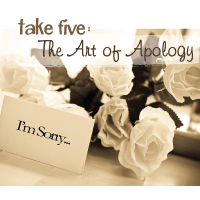The Art of Apology

Have you ever experienced the situation when someone has apologised but, while the words were said it lacked something, making it difficult for you to accept it?
Sadly, most of us are not as good at apologising as we need to be. We think that it’s obvious, should just be instinctual, or that our love should somehow make it magically work.
Well, it isn’t obvious, and it is not instinctual. We have learned the hard way that it is an acquired skill and practice helps. Here are five aspects to the Art of an Apology.
1: Admit our Error
It’s amazing how hard we find this to do. We acknowledge that something went wrong, but we dodge and weave to avoid accepting our responsibility. There’s always an excuse, or someone else who is more at fault. E.g., “I know said things that hurt you, but you made me so angry!”
The thing is, as soon as ‘but’ or ‘if’ slips into the admission of error, the message that our spouse hears is that we really don’t believe we are at fault. Taking responsibility for our error is essential for our intimate relationships to thrive and is fundamental to our spiritual growth.
2: Acknowledge the Harm
One of the things that holds us back from accepting an apology is the sense that the other doesn’t understand the extent of the harm. Absent a sense of their genuine understanding of our hurt, we have no confidence that there is a motivation to avoid its repetition.
A clear articulation of the harm caused is tremendously healing. To hear the one who hurt us name and validate the specific ways that we have been impacted disarms our defences and opens us to their apology.
3: Express Sorrow
“I’m SORRY! OK?!” is not an apology in anyone’s language. Too often we think that if we just say the words “I’m sorry” then it is enough.
Well, the words must be said with genuine sorrow and regret. They must be heartfelt and if we have (1) Admitted our Error and (2) Acknowledged the Harm, then they naturally will be.
In fact, if we don’t feel deep, authentic sorrow after doing the first two steps, we either didn’t do them properly or there’s something wrong with us and we need to see a psychologist! Jokes aside: if we don’t feel sorrow for the hurt caused then we can’t effectively apologise.
4: Commit to Change
Most of the ways we hurt each other as husband and wife are ‘serial offences’ – they don’t just happen once but are a pattern pf hurtful behaviour.
To be able to forgive AND trust again with full openness, there must be a demonstrated commitment by the other to reform. Said simply, words and intentions need to be followed through with consistent action.
5: Request Forgiveness
This is the hardest part of an apology because it requires the surrender of all power to the offended person. When we ask for forgiveness, we are really asking the other to let us back into their hearts. If we’ve worked through the above steps, and have a genuine sorrow, asking for forgiveness is a natural next step and so much more potent than simply saying sorry. But forgiveness can never be demanded, and the response must always be respected, even if forgiveness is initially withheld.
Being able to successfully reconcile in a marriage is a vital skill for sustaining the warmth and affection. There is an ‘Art’ to an Apology, and like any skill in life, it is perfected with practice.





Wonderful article and a reminder about our days when my wife & I worked in our parish’s marriage prep program. Your piece highlights that apologies can be needed when the hurt person tells us that they’re hurt (as we may not have realized it). But often we do know of our transgression and we must affirmatively set it right and seek forgiveness. We would tell couples that this latter situation is also why the Sacrament of Reconciliation is so important. In both cases, we must look deeply within (examine our conscience), honestly see if we’ve hurt our beloved (God or spouse), and seek forgiveness.